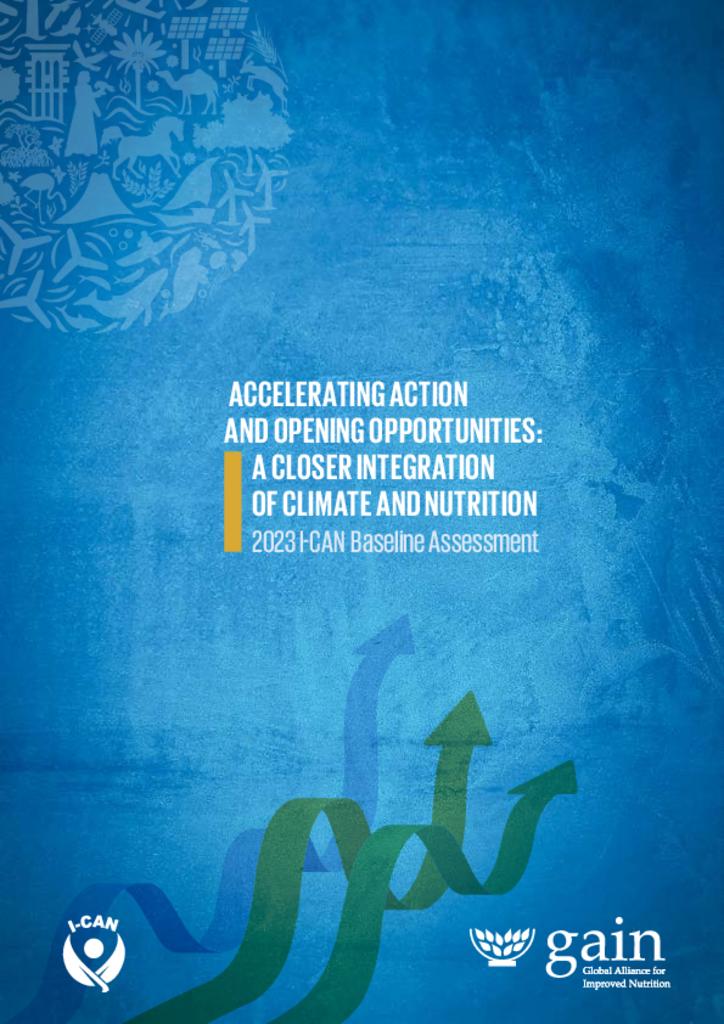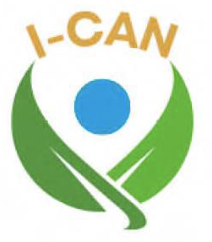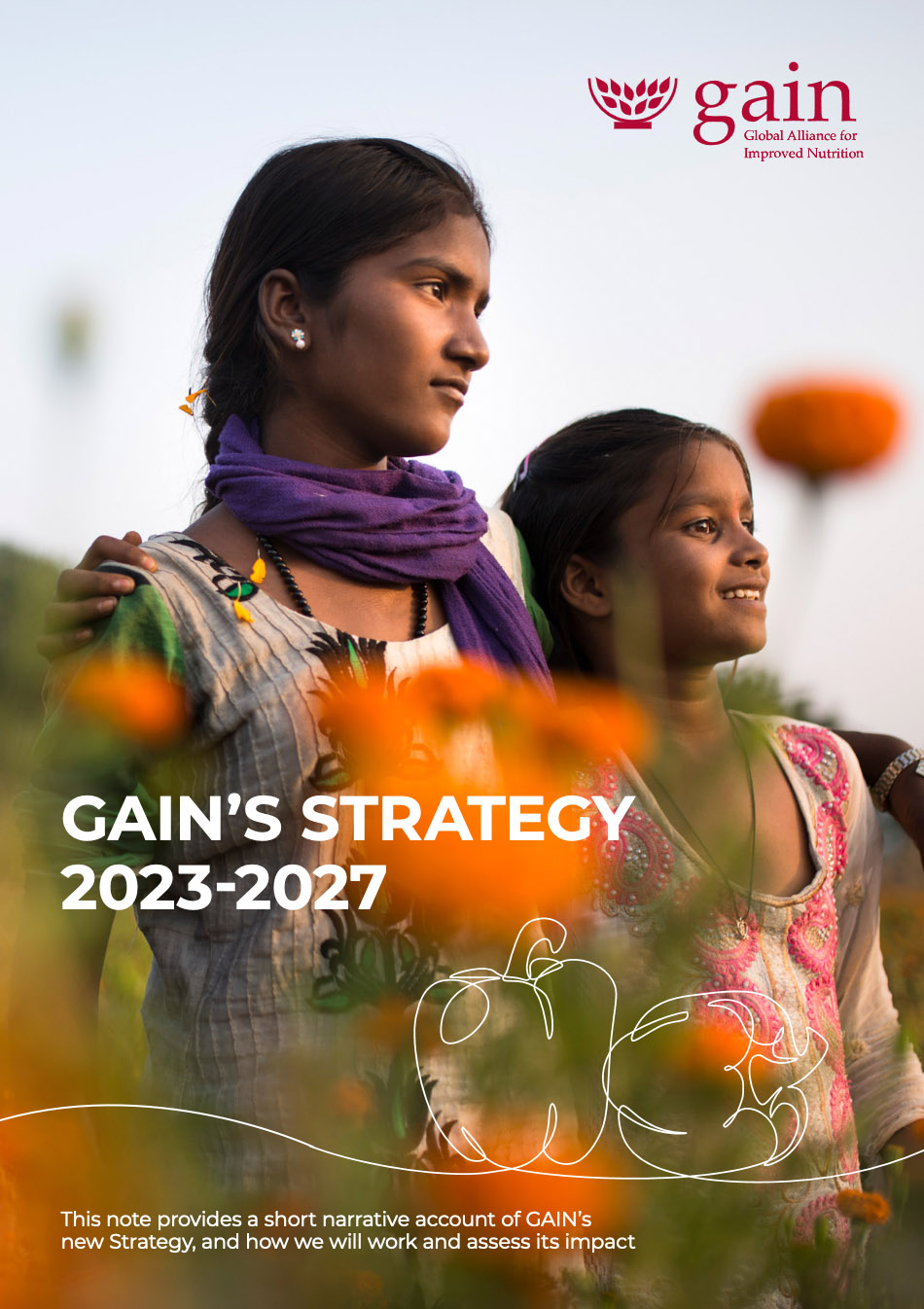

Project Officer, Urban Food System Governance - SYS-1095
Senior Monitoring Associate - SYS-1093

We must address the interconnected challenges of climate change and nutrition
Launching today are two reports outlining both the pathways through which nutrition and climate are connected and the current state of action on addressing these two issues. The reports will be launched at a side event co-hosted with the World Health Organization (WHO), the Food and Agriculture Organization (FAO), the Global Alliance for Improved Nutrition (GAIN), and the Scaling Up Nutrition (SUN) movement, along with an official reception hosted by Canada, New Zealand, and the United Kingdom.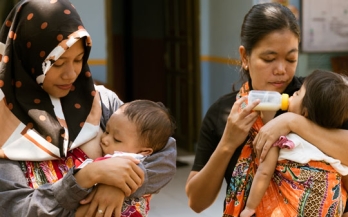
An urgent call to scale-up access to healthy diets for the most vulnerable
Nutrition and Food Systems experts along with world leaders come together, in this week of World Food Day, for the Sixth Global Conference of the Micronutrient Forum, at the World Forum in the Hague, Netherlands.Accelerating Action and Opening Opportunities
A Closer Integration of Climate and Nutrition
2023 I-CAN Baseline Assessment
The Initiative on Climate Action and Nutrition (I-CAN) is a multistakeholder, multi-sectoral global flagship program
Launched by Government of Egypt at the “Adaptation and Agriculture” thematic day at COP27
Core partners include WHO, FAO, UN-Nutrition secretariat, GAIN and SUN
Formally hosted as a climate and nutrition working group under the Alliance for Transformative Action for Climate and Health (ATACH) co-chaired by the Government of Egypt and GAIN.
0C
It is likely that warming will exceed 1.5°C during the 21st century
0M
As many as 828 million people are undernourished
US$0trillion
The impact of malnutrition in all its forms is estimated to be US$3.5 trillion each year
Breaking down the I-CAN Baseline Report Findings
The I-CAN baseline report aims to provide a snapshot into the current state of integration between climate and nutrition. Across the board, we see low levels of climate-nutrition integration within action, data capacities, policy and strategy, and finance. However, there are many opportunities where climate and nutrition can be closer integrated to accelerate win-win benefits in both domains. I-CAN strives to further advance actions in this area.
The intersection of climate and nutrition action is rich with opportunity to accelerate advancement in both outcomes. For the first time an evidence based report shines a light on those opportunities for decision makers in government, development agencies and the private sector.
As we approach COP28 a new landscape of opportunity to advance climate and nutrition action has been revealed. We must seize these opportunities for people and planet.
Lawrence Haddad, Executive Director, GAIN
Climate policy commitments rarely consider nutrition
For the I-CAN baseline report, we have developed a methodology where 4 classification levels are used to determine the degree of integration between climate and nutrition. These classification levels are used across a range of indicators (where applicable) and are designed to be action-oriented progressing toward the higher levels.
Integration of Nutrition into Nationally Determined Contributions (NDCs) (% of total, N=162*)
27 EU countries submitted a joint NDC which we have counted as 1 NDC in this analysis
NDC Levels by Region (% of total region, N=162)
Integration of Nutrition into Climate National Adaptation Plans (NAPs) (% of total, N=43)
Integration of Climate into National Nutrition Plans (NNPs) (% of total, N=50)
Finance Appears to be Lagging Behind Policy Commitments
Limited Evidence of Climate Integration in Other Nutrition Action Areas
Global Nutrition Report (434 commitments analysed)
- 95% of commitments did not include climate considerations
- Only 1% of commitments directly targeted climate improvement
Food-Based Dietary Guidelines (FBDGs) (70 countries analysed)
- 54% of FBDGs did not consider climate or sustainability
- Only 11% of FBDGs recommended eating climate-friendly foods with
clear examoles of how to do so
Public Food Procurement (93 countries analysed)
- 83% of countries did not factor climate into public food procurement nutrition-related policies (e.. in school meals and feeding)
- Only 7% of countries included one or more mandatory sustainability requirements in public food procurement nutrition-related policies
(GNR Commitments Source: Global Nutrition Report NAF Commitment Tracker, version as of April 2023)
(FBDGs Source: FAO FBDG Database, versions as of July 2023)
(Public Food Procurement Nutrition-Related Policies Source: WHO GINA database, version as of June 2023)
Conclusion
What are the applications of the I-CAN baseline report findings towards improving climate and nutrition outcomes?
First, the report identifies opportunities for countries, businesses, and development agencies to improve integration of climate and nutrition action to spur acceleration in the outcomes of both. For example, many initiatives target food and agriculture broadly, which could be leveraged to include more explicit considerations of nutrition.
Second, there are bright spots with certain countries, businesses and agencies leading the way. The NDC of Benin, the Climate NAP of Bangladesh, and the NNP of Ethiopia are all best practices included in the I-CAN baseline report. Cross-learning and information sharing will go a long way towards integrated climate and nutrition advancements.
Third, the actions that serve to accelerate climate and nutrition need to become better understood and socialised. FAO’s I-CAN paper, Climate Action and Nutrition: Pathways to Impact, highlights four core systems: agri-food, water, social protection, and health, where opportunities to further advance climate-nutrition integration exist.
Fourth, there were many challenges in collecting the baseline data. For example, an area which we could not assess includes the amount of agriculture research and development funding that links climate and nutrition. We hope that methods for collecting integrated climate-nutrition data will be improved and hence enhance data availability in the future.
Fifth, we very much hope that individual countries will use the baseline to set their own targets for some of these indicators. All country-level data used in our analysis are available upon request. Tracking of indicators towards targets will help governments assess progress and identify areas where more support can be brought to bear.
2030 is drawing close. Time is of the essence as we strive to achieve the SDGs, aiming to eliminate hunger and malnutrition whilst ensuring positive impacts for climate action and our natural environment. With sustained and combined efforts, closer integration between climate and nutrition is possible, and will have positive impacts on the lives of millions around the world – today and tomorrow.


About GAIN
At GAIN we believe that everyone in the world should have access to nutritious, safe, and affordable food.
The Global Alliance for Improved Nutrition (GAIN) is a Swiss-based foundation launched at the United Nations in 2002 to tackle the human suffering caused by malnutrition. Working with governments, businesses and civil society, we aim to transform food systems so that they deliver more nutritious foods for all people, especially the most vulnerable.
Headquartered in Geneva, Switzerland, GAIN has offices in countries with high levels of malnutrition: Bangladesh, Benin, Ethiopia, India, Indonesia, Kenya, Mozambique, Nigeria, Pakistan, Rwanda, Tanzania and Uganda. To support work in those countries, we have representative offices in Denmark, the Netherlands, the United Kingdom, and the United States.
At GAIN, we believe that everyone in the world should have access to nutritious, safe, and affordable food. Today, one in three people - drawn from nearly every country on the planet - are unable to consume enough nutritious food. We work to develop and deliver solutions to this daily challenge.
0bn
people accessed fortified food through GAIN
0%
of the entire population of the world
0k+
citations to GAIN’s knowledge products
By understanding that there is no "one-size-fits-all" way of dealing with this problem, we develop alliances and build tailored programmes using a variety of models and approaches. We work through national, regional, and global alliances that provide technical, financial and policy support to a wide range of public and private organisations, focusing attention on where people get their food from – markets. As a result, we give priority to finding ways to change and improve how businesses and governments shape food systems for improved nutrition.
What matters most for us is impact. Our purpose is to improve the consumption of nutritious and safe foods for all. We focus on children, adolescents, and women because we know that working with these groups is crucial to transforming attitudes about food and hence life chances and livelihoods. We are supported by over 30 donors and work closely with international organisations and United Nations agencies.
We aim to make nutritious and safe foods accessible to everyone, especially the most vulnerable, to help end hunger and attain healthy diets for all, in ways that are good for the environment.
Our history
Click the dates to discover the milestones of our organization
GAIN was launched
The Global Alliance for Improved Nutrition (GAIN) - a Swiss-based foundation - was launched at the United Nations in 2002 to tackle the human suffering caused by malnutrition. Working with governments, businesses and civil society, we aim to transform food systems so that they deliver more nutritious foods for all people, especially the most vulnerable.
Investing in the future: a united call to action on vitamin and mineral deficiencies
In partnership with the Flour Fortification Initiative, the U.S. Agency for International Development (USAID), the World Health Organization (WHO), the World Bank, UNICEF and the Micronutrient Initiative, we contributed to the publication of the 2009 report "Investing in the Future: A united call to action on vitamin and mineral deficiencies".
The report called on governments and other partners to increase investments in life-saving vitamins and minerals and provides concrete recommendations to improve the delivery of supplements and fortified food to women and children around the world.
Investing in the future: a united call to action on vitamin and mineral deficiencies
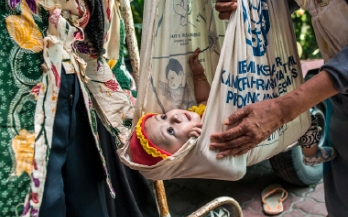
A child in Indonesia
GPF Launch
The GAIN Premix Facility (GPF) was launched to tackle the challenges that many companies and organizations involved in food fortification face in accessing reliable sources of quality, affordable micronutrient premix, a commercially prepared blend of vitamins and minerals used to fortify staple foods. An estimated 60 million consumers are being provided with higher quality nutrition through GPF. GAIN received funding from the Khalifa Bin Zayed al Nahyan Foundation in the United Arab Emirates to deliver complementary nutrition interventions that will benefit more than 15 million people in Afghanistan
AIM Launch
At the 2009 GAIN Business Alliance Global Forum in the Netherlands, the Amsterdam Initiative on Malnutrition (AIM) is launched by GAIN, the Government of the Netherlands, Unilever, DSM, AkzoNobel and Wageningen University. The initiative aims to eliminate malnutrition for 100 million people in Africa by 2015 and will grow through public private partnerships.
GAIN's new legal status
The Swiss government granted a special legal status to GAIN as an international organization under the Swiss Federal Act on Privileges, Immunities, Facilities and Financial Aid. The agreement was co-signed in Bern on behalf of the Federal Council of Switzerland by Ambassador Valentin Zellweger, Director of the International Law Department of the Swiss Foreign Affairs Ministry, and by GAIN’s Executive Director Marc Van Ameringen.
GAIN's Marketplace for Nutritious Foods
Initiated an Agriculture and Nutrition Program, which began work on the Marketplace for Nutritious Foods in Kenya, Mozambique and Tanzania. The "Marketplace" aimed to improve the nutritional quality, affordability, and variety of food in the diets of the malnourished. It does this by investing in local small and medium-sized enterprises (SMEs) with innovative ideas that, once realized, will improve the way food is grown, stored, processed, and consumed.
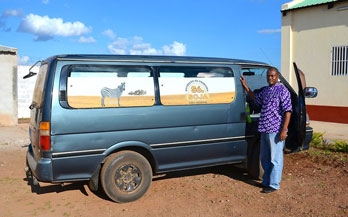
One of the Marketplace business
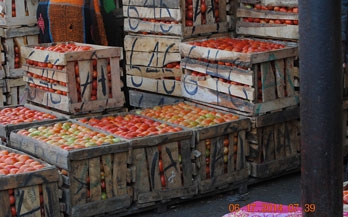
Crates of tomatoes in Nigeria

Assessing one of the Marketplace projects in Africa
New Offices
Opened new offices in Bangladesh, Ethiopia, Ghana, Indonesia and Singapore.
Ten years: half a billion lives changed
GAIN’s goal is to improve the lives of vulnerable populations around the world through access to affordable, better quality, nutritious foods.
We aim to reach one billion people. After ten years, our programs are already reaching more than 530 million including 250 million women and children and demonstrating public health impact:
- 30% reduction in anemia among women of child bearing age in sentinel sites in China
- 30% reduction in neural tube defects in new borns in South Africa
- 14% reduction in micronutrient deficiencies in young children in Kenya
We work to reduce malnutrition by mobilising public private partnerships that implement innovative and sustainable market-based solutions at scale.
Launch of ATNI
In partnership with the Bill & Melinda Gates Foundation and the Wellcome Trust, GAIN launched the Access to Nutrition Index (ATNI), a new global initiative that evaluates food and beverage manufacturers on their policies, practices and performance related to obesity and undernutrition.
GPF success
Five years after the start of the GAIN Premix facility it reached more than 150 million people with quality premix for fortification of staple foods.
Twenty blenders, 40 micronutrient suppliers and five micronutrient powder producers supplied more than USD47 million in premix to 41 countries.
Launch of FACT
Launch of the first Fortification Assessment Coverage Toolkit (FACT) in Senegal in order to understand better how large scale food fortification programs impact public health.
Fortification Assessment Coverage Toolkit (FACT) Survey in Senegal
GAIN Nordic Partnership
Established in 2014 by the five founding partners: Arla Foods Ingredients, Tetra Pak, Danchurch Aid, the Confederation of Danish Industry and GAIN. It is a multi-sector platform with an ambition to facilitate scalable and inclusive business models that enhance the nutritional value of food in developing countries. The platform brings together Nordic companies, civil society, academia and the public sector in a forum for collaboration, action and knowledge sharing.
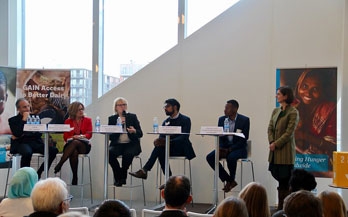
GAIN Better Dairy event together with WFP
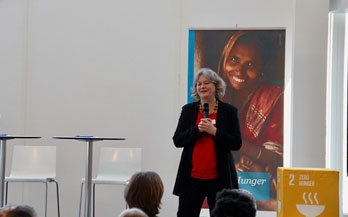
Charlotte Pedersen, Head of GAIN Nordic, speaking at an event
Global Summit on Food Fortification
Together with The Government of Tanzania and other development partners (African Union, the Bill & Melinda Gates Foundation, the Scaling Up Nutrition Movement, UNICEF, USAID and the World Food Programme) convened the first Global Summit on Food Fortification in September 2015. The three day event, part of international efforts to reinvigorate interest, awareness and investment in food fortification, was attended by 30 governments from countries suffering the highest levels of micronutrient malnutrition. It offered the opportunity to assess lessons learned and to forge a shared strategy to highlight the role of food fortification in food security and within the Sustainable Development Goals.
The Summit culminated in the Arusha Statement on Food Fortification.
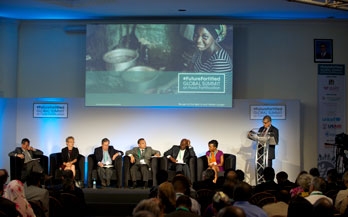
Marc Van Ameringen speaking at the Food Fortification Summit in 2015

Jay Naidoo, Chairman of the GAIN Board of Directors, speaking at the Summit
The POSHAN project
Started two new maternal, infant and young child nutrition projects in India, addressing both chronic and acute malnutrition. Firstly, in collaboration with the World Bank and the Karnataka Health Promotion Trust, we support women groups producing nutritious supplementary foods for 40,000 children in the State of Karnataka.
With the second project, together with UNICEF and ACF, we supported the Rajasthan Nutrition and Health Mission in a large-scale pilot of community-based treatment of 9,000 severely acutely malnourished children in 13 districts in the State of Rajasthan.
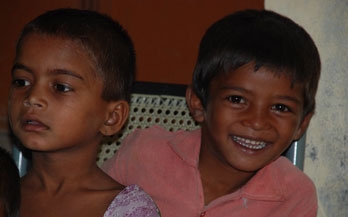
Kids enrolled in the POSHAN project
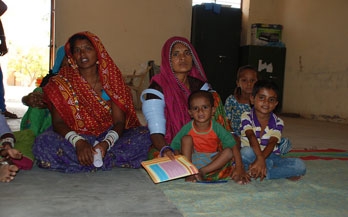
One of the families enrolled in the POSHAN project
The UNICEF-GAIN Partnership Project
Successfully closed the Gates-funded GAIN-UNICEF Universal Salt Iodization project in December 2015 which helped protect an additional 466 million people against iodine deficiency, including 113 million children.
Universal Salt Iodization, which has been implemented around the world, helped decrease the number of countries classified as iodine deficient from 54 in 2003 to 25 in 2015.
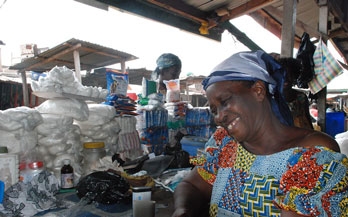
Woman packing salt in a market
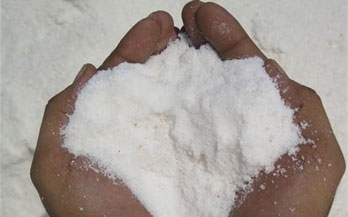
Man holding salt in his hands
Lawrence Haddad
Lawrence Haddad appointed new Executive Director of GAIN.
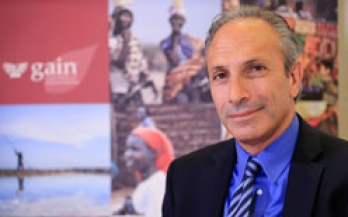
Lawrence Haddad chosen as the new Executive Director for GAIN
The fortification Technical Advisory Group (TAG)
Following the first ever global summit on food fortification in Tanzania in September 2015, we led over 20 partners as part of a fortification Technical Advisory Group (TAG) to consolidate the event's ground-breaking findings and map a way forward for partners.
A report published on the Future Fortified summit drew attention to the potential of food fortification to cost effectively reach billions of people with essential micronutrients. It emphasized the need for investment, better standards and regulation, and improved evidence gathering to make programs even more effective.
GAIN turns 15!
In 2017 GAIN celebrated its 15th Anniversary.
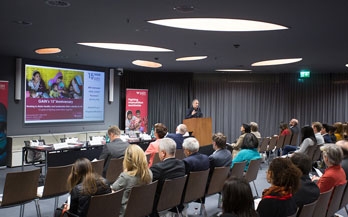
Panel discussion at GAIN 15 anniversary
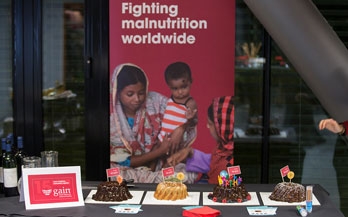
Cakes at GAIN 15 Anniversary
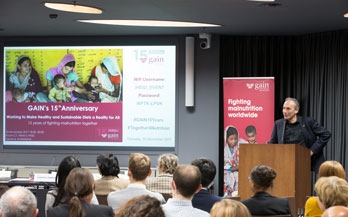
Lawrence Haddad speaking at GAIN 15 Anniversary
Launch of GAIN New strategy
During the reporting period (1 July 2016 to 30 June 2017), the GAIN Board conducted a wide-ranging consultation and adopted a new five-year strategy (2017–2022). This strategy confirmed GAIN’s purpose to advance nutrition outcomes by improving the consumption of nutritious and safe food for all people, especially those most vulnerable to malnutrition. In particular, we aimed to improve the consumption of safe and nutritious foods for – at a minimum – one billion people over the next five years and target major improvements to the food system, delivering more diverse and healthier diets for vulnerable citizens in countries where we work.
Published the FACT Manual and practical tools and templates
Published the FACT Manual and tools, which enables provides step-by-step guidance on how to decide, design, and conduct a FACT survey. Information generated by a FACT survey can be used by decision makers to improve fortification programmes by documenting successes and identifying gaps
Launch of Making Markets Work (MMW)
Making Markets Work (MMW) supported by the Ministry of Foreign Affairs, Netherlands; the Federal Ministry of Economic Cooperation and Development, Germany (BMZ); Irish Aid; the Swiss Agency for Development and Cooperation; the International Development Research Center (Canada); and the Bill & Melinda Gates Foundation (BMGF) developed Nutrition Connect (a resource hub for what works for nutrition in the public-private space, www.nutritionconnect.org) and a Food Systems Dashboard: a new tool to bring together public and private data on different components of the food system to assess where it needs most attention to strengthen nutrition outcomes.
Executive Course - Together for Nutrition
Developed the first ever Executive Course, in partnership with Unilever, on public-private engagement in nutrition, which was positively assessed by its 25 participants from public and private sectors globally.
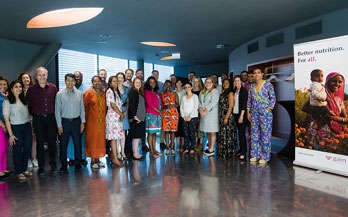
The participants of the Executive Course
The GAIN Paper Series
Launched a new series of papers to disseminate the learning from GAIN’s programmes to diverse stakeholders in tailored formats.
The launch of the Commercialisation of biofortified crops (CBC)
GAIN launched a major new partnership with HarvestPlus, to work to expand the reach of their nutritious varieties of staple crops through commercialisation.
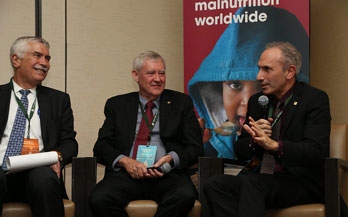
GAIN and HarvestPlus celebrate new partnerships
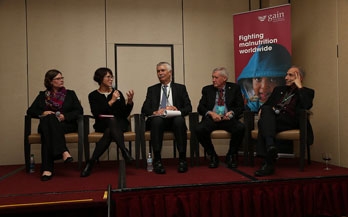
GAIN and HarvestPlus announce a new partnership
New partnerships
Signed several new MOUs in the year, including with the Alliance for a Green Revolution in Africa (AGRA) (to link our SME work better with smallholder farmers); Euromonitor (to access retail sales data); the Food and Agriculture Organisation (FAO) (on our urban and SME programmes), and the Sustainable Trade Initiative (IDH) (workforce).
GAIN invited to be a core partner of two important influencing initiatives, the Food Systems Dialogues, and the Food and Land Use Coalition (FOLU).
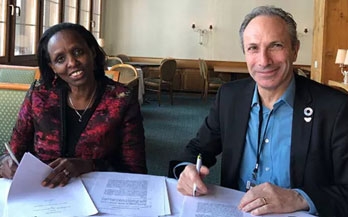
Lawrence Haddad signs a MoU with Agnes Kalibata
EatSafe launched
EatSafe: Evidence and Action Towards Safe, Nutritious Food, is a USAID-funded, five-year multi-country programme aiming to enable lasting improvements in the safety of nutritious foods in traditional markets by focusing on consumer demand. EatSafe is unique in its design, highlighting the intersection of nutrition, health, and food safety and how this intersection affects local economies, food systems, and consumer behaviour
Keeping Food Markets Working and Response to the pandemic
As a response to COVID-19, in 2020 and 2021, GAIN provided $16m to maintain food supplies in Ethiopia, Kenya, Mozambique, Nigeria, Tanzania, Rwanda, Egypt, Bangladesh, Indonesia, India, and Pakistan. We provided emergency financial support to over 160 food SMEs providing an additional 50 million servings of nutritious foods (fruits, vegetables, animal-source foods (ASFs), biofortified and fortified foods, etc.). We supported 38,402 key food workers (54% female) via vouchers or take-home family food rations.
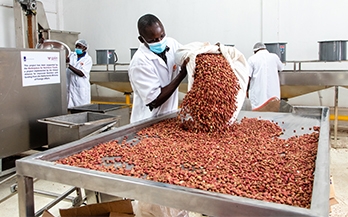
a factory worker with a mask pouring beans into a tray
The UN Food Systems Summit
Active influencing and participation in the UN Food Systems Summit and The Nutrition for Growth summit. GAIN enhanced her reputation during the Summit processes going by the different quotes and comments from leading organizations and international thought leaders.
GAIN led and supported two major new initiatives: the Act4FoodAct4Change and the Zero Hunger Private Sector Pledge.
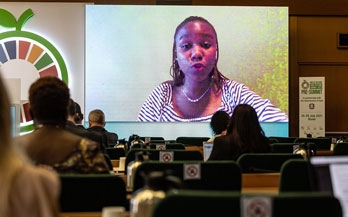
Maureen Muketha speaking live at UNFSS
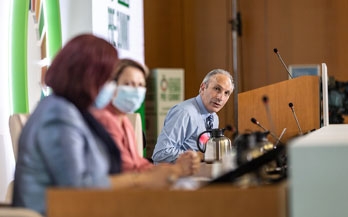
Lawrence Haddad speaking at UNFSS
Lancet Adolescent Nutrition Series
Continued our contribution to a Lancet series on adolescent health which was launched at the Nutrition for Growth Summit in December 2021.
Welcome to 20!
GAIN Turns 20!
On the 9th May 2002, GAIN was founded with the aim of tackling human suffering caused by malnutrition.
Over the past 20 years, we have been working with governments, businesses and civil society to transform food systems so that they deliver more nutritious foods for all people, especially the most vulnerable.
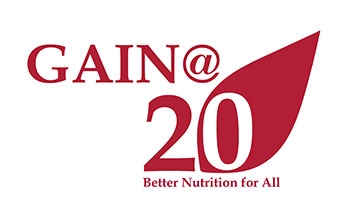
The official GAIN20 logo
Benin - GAIN opens an office in the country to strengthen the fight against malnutrition
On Thursday 14 September 2023, GAIN signed a memorandum of understanding with Benin's Ministry of Agriculture to implement its activities.
GAIN is thus inaugurating its official presence in the country.
Benin - GAIN opens an office in the country to strengthen the fight against malnutrition
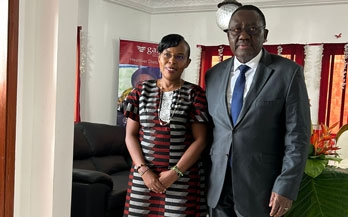
Françoise Sayi, Country Director GAIN Benin (left) together with the Benin's Ministry of Agriculture (left)
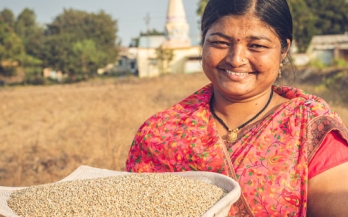
Reaching Lower-Income Consumers with Nutritious Foods - Cross-Subsidisation and Segmenting by Quality
In a cross-subsidisation model, one product is sold with a larger margin, with the excess profit used to subsidise another product sold at a smaller margin (e.g., by covering all or most company fixed costs with the higher-margin channel). BMR’s systematic review found several examples of companies using this strategy with the same product sold in different forms or settings to different groups of consumers.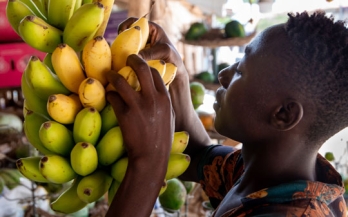
Africa Can Feed the World
Delegates numbering more than 5,000 and representing over 90 countries converged to explore strategies to harness Africa's vast potential in expediting the development of regional, national and sub national food systems that would not only benefit the continent but also the entire world.
